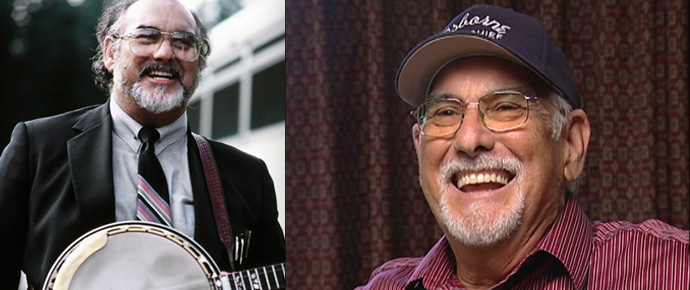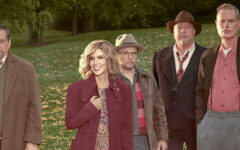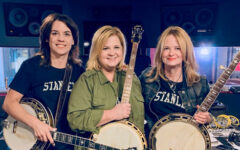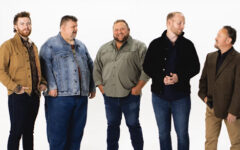
Sonny Osborne (left) at Darrington in 1987 – photo © Barry Brower/The Osborne Brothers
Most musicians hope to leave a mark on the world through their art: a particularly well-written lyric, a ferocious banjo lick, perhaps even a style of playing named after them. Sonny Osborne will surely be remembered for all of those things by the thousands of bluegrass fans and artists who have viewed him as an inspiration for decades. However, Osborne himself wished to be remembered for more than just his innovations in bluegrass. In a 2009 interview with Tom Riggs, Osborne expressed his desire to be known as an “honest, fair, human,” and a “good person” even though he felt it was a “stretch of the imagination.”
The banjo playing of Osborne, who passed away this afternoon around 1:30 p.m. at the age of 84, has perhaps been heard more than any other bluegrass picker (save possibly Earl Scruggs), thanks to the worldwide fame and enduring presence of the Osborne Brothers’ hit, Rocky Top. However, there was certainly much more to Osborne than what was basically a novelty song at the time. Born in 1937 in the mountains of southeastern Kentucky’s Leslie County, Osborne first picked up the banjo around the age of 11 and began pursuing music professionally just a few years later at 14 while living in Dayton, Ohio. He was hired by Bill Monroe in the summer of 1952, at the end of his freshman year of high school, and went on to both record and perform on the Grand Ole Opry with Monroe over the summer. Though he returned to Ohio to begin 10th grade, he quickly returned to Monroe and stayed on as a Blue Grass Boy until his brother Bobby returned home from the service in 1953. Bluegrass history was certainly made when the Osborne Brothers premiered on WROL in Knoxville, TN, on November 8, 1953.
Throughout the 1950s, the Osbornes worked at a series of radio and television stations, including the Wheeling Jamboree, and recorded now classic collaborations with artists like Jimmy Martin and Red Allen. Though Bobby’s voice was often most prominently in the spotlight, one might argue that it was Sonny who truly brought the Osborne Brothers to legendary status. His work to turn the group into a commercial success included incredibly innovative sounds for the time – plugging in instruments at a time when that was basically forbidden in bluegrass, creating banjo licks from the sounds of other genres, and completely reinventing bluegrass harmonies with the famous stacked trio vocals. He marketed the Osborne Brothers to venues and audiences that often ignored bluegrass in favor of country or even rock music, and became the first bluegrass group to appear on a college campus with their 1960 performance at Antioch College.
The playing of Sonny Osborne was far from today’s popular “1-4-5 drive” and “mash in B.” He took the basic elements of bluegrass banjo and elevated them to new heights while still maintaining a strongly traditional feel. Listen to Osborne Brothers songs from the 1960s and ’70s and you may hear bits and pieces of what might as well be horn and pedal steel solos – just played on the banjo. For a number of years, he played six-string banjo both on recordings and on stage, adding another new layer to what was acceptable in bluegrass music. His playing was both tasteful and complex – just listen to his solo rendition of America the Beautiful, a performance of which brought the audience to tears at the 2001 IBMA Awards, held just days after the 9/11 attacks.
Though he always played it down, Sonny was also a fine singer, complimenting Bobby’s soaring tenor with his own baritone voice, and their sibling harmony was always a major part of their appeal.
Many of today’s younger musicians never had the chance to hear Osborne perform live, due to his retirement in the early 2000s after issues following rotator cuff surgery. However, he stayed involved in the bluegrass world through his promotion of the Osborne Chief banjos, mentorship of younger and up-and-coming musicians, and most recently, the development of the Krako banjo line. He also entertained and enlightened Bluegrass Today audiences for the past several years with his weekly question-and-answer column, Ask Sonny Anything. Through the column, Osborne was outspoken in his promotion of traditional bluegrass, as well as his respect for fellow musicians, promoters, and the like.
The Osborne Brothers were made members of the Grand Ole Opry in 1964, and inducted into the Bluegrass Music Hall of Fame in 1994.
Sonny loved life like few others, cherished a laugh with his good friends, and had more stories to relate than you could tell in a week. He remembered almost every detail of his professional life, which he shared gladly with those who wrote him here. He didn’t merely tolerate the questions, he was deeply grateful to receive them, and answered them all to the best of his ability. Even when he suffered a stroke about two months ago, he tried his hardest to fulfill people’s expectations for his weekly column, dictating answers to his wife, Judy, or his good friend, Lincoln Hensley, until it was impossible for him to continue.
Just as there won’t be another bluegrass banjoist anytime soon who will equal his impact on our music, there won’t be another personality as large and broad as Sonny Osborne for quite some time. His stage antics with The Osborne Brothers are legendary, from playing pranks on Little Roy Lewis of The Lewis Family – and having them played on him in return – to loudly berating sound crews if their work wasn’t to his liking, few would ever forget seeing Sonny Osborne on stage. His laugh could be easily triggered, even in the middle of a song, and led to many a special moment with Bobby.
One of his favorite tricks was repeating any “off note” he might hit by mistake repeatedly in a song, so everyone understood that he “meant to do that.” He and Bobby worked an audience as well as anyone who ever played bluegrass, often earning multiple encores with their dozens of hit songs. Kentucky, Once More, Georgia Mules and Country Boys, Roll Muddy River, Fastest Grass Alive, Ruby, Making Plans, and many other popular Osborne Brothers songs filled their live sets with fan favorites.
The family has not yet announced any information about funeral arrangements.
R.I.P., Sonny Osborne. We have lost a true giant in bluegrass music.







